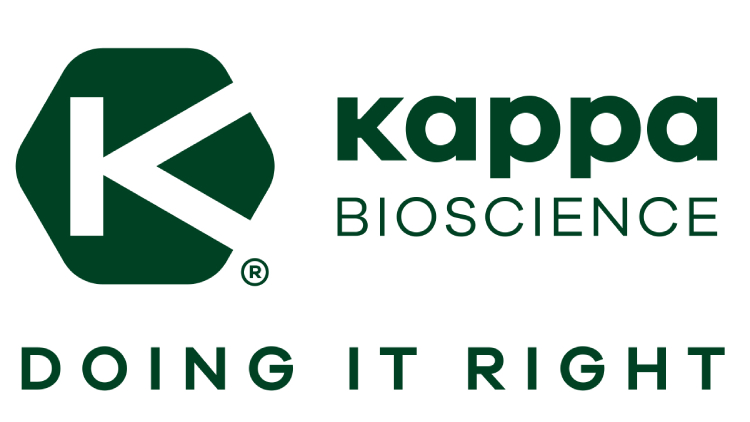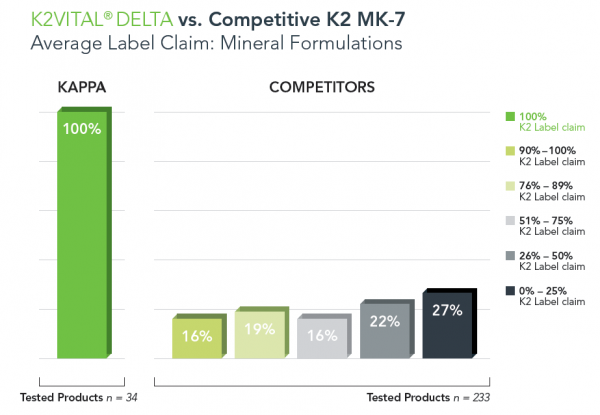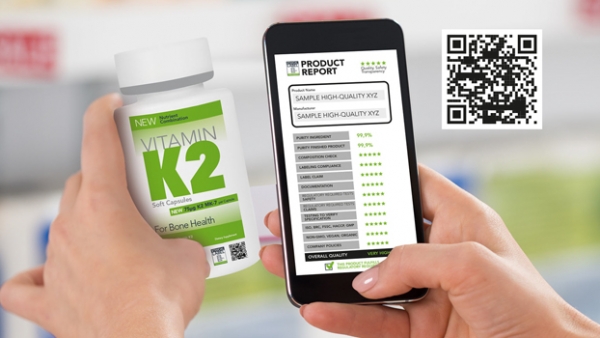Promotional Features
Dietary supplements, active ingredients and adulteration: A vitamin K2 example
Consumers shouldn’t need to question the quality of dietary supplements. They expect that products - and their active ingredients - meet minimum standards. Or they would not buy them. Health claims on product packaging are assumed to be backed by scientific studies, and that there is oversight. Purity should never be in doubt and products are assumed safe. Consumers expect shelf-stable products that will deliver health benefits until the expiration date.
These requirements, plus others, are the ‘secondary promises’ that every product makes to consumers. They are likely taken for granted, and consumers generally trust that by meeting these requirements a product will deliver on its ‘Primary Promise’.
The Primary Promise of a dietary supplement is to deliver one or more active ingredients. These ingredients are responsible for the physiological effects that provide benefits, and are the basis for health claims. The effects of the active ingredients underpin consumer expectations, whether the biological mechanisms are fully understood or not. Delivery of a non-active ingredient, or the omission of the active ingredient for any reason (including instability), is a failure of a product to deliver on its Primary Promise. Product adulteration is the industry term for failure to meet any claims on product labeling.
Vitamin K2: A positive example
The Primary Promise of vitamin K2 MK-7 is to activate osteocalcin and matrix Gla proteins (MGP). These are the ‘calcium mediating proteins’ which contribute to bone and cardiovascular health. The relationship between K2 and K2-dependent protein activation is scientifically proven, and these effects underpin the bone or heart health claims that drive consumer purchases. K2VITAL vitamin K2 puts calcium in balance.
By delivering on all ‘secondary promises’ a vitamin K2 product should also deliver on its Primary Promise of active MK-7. Studies show, however, that this is not always true, whether for vitamin K2 or many other ingredients. Products can still fail to deliver the active ingredients listed on the label (e.g. miss label claim), despite the regulatory framework.
How widespread is this problem? A 9-year study conducted by Kappa Bioscience on over 400 vitamin K2 products showed that in some categories up to 84% missed label claim. Standard, unprotected K2 MK-7 is not stable in high-alkaline environments such as with calcium or magnesium. Most of these products missed label claim because of the stability/degradation of unprotected K2 in a mineral formulation. Kappa also found that nearly 15% contained biologically inactive cis MK-7. https://www.kappabio.com/market-study-2010-2019
Vitamin K2 is just one industry example and this story has a happy ending. Kappa solved K2+minerals stability by developing protected, microencapsulated K2VITAL DELTA. While DELTA is the clear market leader, representing about 12% of the global K2 market, healthy competition among several high-quality K2 producers has improved overall quality. Market education at the company level made a difference. But can more be done at an industry level?
Supplements, food law and adulteration
Dietary supplements are regulated under Food Law. The problem is that standard food products are not expected to deliver specific, measurable active ingredients.
While Food Law regulation is in place, testing shows that not all supplement products deliver quality. Gaps in monitoring, testing or enforcement allow sub-standard products to market. Pharmaceutical products are also expected to deliver active ingredients but have stricter requirements (which probably exceed the needs of the dietary supplements industry). Dietary supplements are somewhere in the middle.
Kappa’s findings for vitamin K2 are not uncommon. A Google search on ‘supplement adulteration’ will return studies about multiple ingredients and categories. Adulteration is an industry-wide problem. Botanical and sports nutrition products are a frequent target, but the problem extends to other high-value ingredients. Industry, and occasionally global media, typically focus on cases where harmful or illegal substances are found in products – substances in products that shouldn’t be. Contaminants, pharmaceuticals, banned substances and excessive overage are typical examples.
Equally important but less visible are the cases where the active ingredient is omitted, substituted, or has degraded (stability). ‘Missing ingredient’ seems to get less attention. Study authors may be hesitant to name brands and products absent the smoking-gun of finding something that should not be in a product. As a result, some products fail to deliver on their Primary Promise, and responsible manufacturers are put at an economic disadvantage. What’s driving this?
Online purchases and the Primary Promise
At the top end of the dietary supplements market, suppliers to supermarkets and pharmacies are usually certified according to standards such as IFS (International Food Standard), BRC (British Retailer Consortium) and/or ISO 22000:2005, and have HACCP in place. In practice, however, a company may be able to manufacture food supplements without even knowledge of standards. HACCP is a legal requirement, but it is only spot-tested and testing is typically focused on the companies that supply mass markets. This may leave the door open for less quality-minded manufacturers.
‘Amateur’ brands, for example, can set up shop online where there is less oversight of manufacturing standards and less accountability. Online sales of dietary supplements are growing significantly faster than other channels, and this trend is increasing (Nutrition Business Journal, 2019). Extremely low price is sometimes a red flag, but consumers (justifiably) rely that the ‘secondary promises’ will ensure both quality and a bargain. They may be unaware that no independent testing to verify quality is required, and that brands that primarily conduct business online may not always adhere to minimum standards. This is unfortunate for responsible online brands that, along with the rest of the industry, must find a way to communicate quality.
The Ethical Label, blockchain and trust – An industry solution
Industry-wide transparency and testing under one certified and audited standard is a viable solution to communicate quality. A consumer-facing certification program powered by blockchain technology could provide ingredient transparency from source-to-shelf. The creation and adoption of an Ethical Label standard would signify a commitment to:
1) Deliver on promises to consumers, including active ingredient label claim
2) Comply with legal and regulatory requirements
3) Maintain transparent documentation, including third-party quality testing of finished products
The Ethical Label has been a recurring subject among industry leaders, but the challenge has been evolving the idea from a ‘voluntary commitment’ to a real-world application that supports enforcement. Developments in blockchain and mobile technology likely have moved the Ethical Label closer to reality. Blockchain coding would theoretically allow ingredient traceability through a product’s full supply chain. Mobile technology including QR codes would allow consumers to make on-the-spot investigations in retail and online purchase environments. Technology, combined with testing under one certified and audited standard, is a vehicle for building consumer trust.
Jörg Büttinghaus, VP Sales & Marketing at Kappa Bioscience comments, “Transparency, traceability and quality are fundamental to maintaining consumer trust and running an ethical business. There is a need for an industry-led quality platform that provides accountability for producers and strengthens consumer confidence in products. Is this science fiction and feel-good marketing? I don’t think so. The Ethical Label concept has been discussed for several years and I think we’ll begin seeing the infrastructure for such a platform no later than 2021. It’s time to start taking this idea seriously.”
For more info on K2VITAL, K2 stability, or Kappa’s transparency-building initiatives visit kappabio.com.



